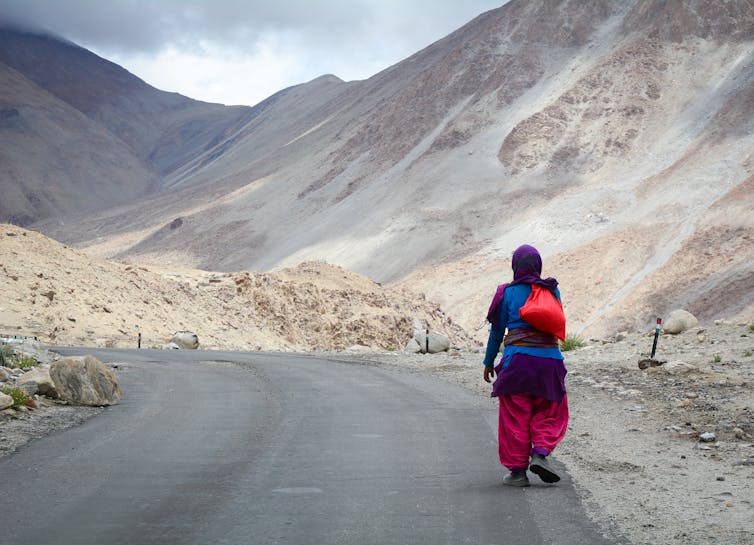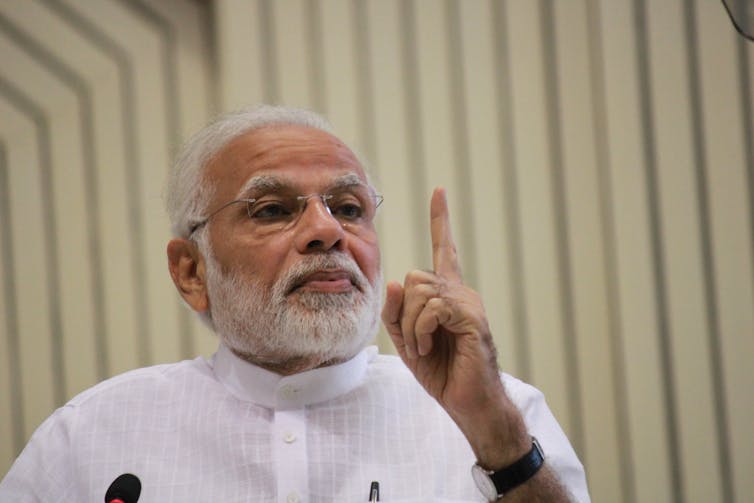By Sita Bali, Staffordshire University
Tensions in the Kashmir region were already building after more than 40 Indian troops were recently killed by a suicide bomber. India’s “pre-emptive strike” over the disputed border on Tuesday – the first of its kind by India since it went to war with Pakistan in 1971 – has escalated the situation further. India said it had targeted a terrorist training camp and accused Pakistan of violating a 2003 ceasefire, while Pakistan now claims to have shot down two Indian fighter jets.
The origins of the Kashmir conflict lie in British imperial disengagement from the subcontinent. At independence in 1947, the unpopular Hindu Maharaja of Kashmir was faced with invasion by Pakistani tribesmen. He turned to India for help, signing the treaty of accession that took Kashmir into the Indian Union. India sent troops to Kashmir and so began the first war between India and Pakistan.
The Pakistanis were held off by Indian troops after they occupied one-third of Kashmir in 1948. Today, Pakistan continues to occupy that third and India holds the remaining two-thirds including the Kashmir Valley. The border between these two areas in Kashmir is demarcated by the Line of Control (LoC), established after fighting in 1947-48. This demarcation has changed little in all the conflicts of the subsequent years.
Maharaja Hari Singh’s move to join India was supported by the popular secular Kashmiri political movement - the National Conference, led by Sheikh Abdullah. Particularly so, as India agreed a special status for Kashmir within the Indian Union – spelled out in Article 370 of the Indian Constitution. A further article in the constitution prohibits people from outside Kashmir from buying land and property in the state, allowing Kashmir to preserve the balance of its ethnic and religiously mixed population (60% Muslim, 35% Hindu and 5% Buddhist).
 | |
|
 |
| Ladakh: a mountainous region in the disputed north-west of Jammu and Kashmir in northern India. Phuong D. Nguyen/Shutterstock |
Pakistan has always maintained that, in accordance with the logic of partition, Kashmir should have been integrated with it. It attempted to take Kashmir by force in 1947-48 and again in 1965, with no success. The Kargil conflict in 1999 was the last substantial direct confrontation between the two militaries.
Since then there have been regular terrorist attacks on mostly military, paramilitary or government targets in Kashmir. Successive Indian governments have held the Pakistan military and their Inter-Services Intelligence (ISI) responsible for training and aiding the terrorists involved, which Pakistan denies.
After this latest suicide attack, claimed by the Jaish-e-Mohammad (JEM) terror group, the debate now rests on whether the wider apparatus of the Pakistani state was aware of, and can be held responsible for, the actions of a terrorist group based in their country and with supposed links to the ISI.
 |
| Published by Aditya Basu - Grab Your Copy now! |
Modi Operandi
The suicide attack that killed Indian paramilitary personnel takes on added significance because it occurred in the context of the looming general election in India in which the BJP, led by Narendra Modi, is trying to retain its grip on power. Modi and his BJP came to power with a thumping majority in May 2014, promising competent, clean government and economic development.
However, things have not gone well for the government in recent months. The Indian economy is suffering from the long-term effects of the decision to demonetise in 2016 and the inability to generate new jobs. The BJP was also defeated in five state elections in 2018, including key states of the Hindi belt such as Rajasthan and Madhya Pradesh.
 |
| India’s Narendra Modi. Escalation of tensions with Pakistan could play into BJP plans ahead of Indian elections. By Madhuram Paliwal/Shutterstock |
With Modi’s supposed record of economic competence and good governance under challenge, he has increasingly relied on his party’s version of extreme nationalism to keep people’s support. The BJP’s Hindutva ideology sees India as a Hindu country and believes all Indian Muslims should have been forced to move to Pakistan in 1947, and now constitute a fifth column in the country. So an attack such as the recent suicide bombing – whether or not it was actually instigated by Pakistan – plays into Modi’s narrative.
That the attack was carried out by a young man from Indian Kashmir also serves to illustrate the failure of the Modi government in dealing with the Kashmir problem. For more than three years the BJP was itself part of the government of Kashmir in alliance with the People’s Democratic Party of Mohammed and Mehbooba Mufti. This alliance fell apart in 2018, mostly over disagreements between the two parties about how to handle the increase in violence in Kashmir and the radicalisation of young Kashmiris, who were once again taking up arms against India.
The Jaish-e-Mohammad terror group, unusually, took immediate responsibility for the attack. Equally, the Indian response to the attack was a first, in that India has never before responded to terrorism within its borders by attacking Pakistan. India’s airstrike is considered the first major use of air power against Pakistan since 1971.
At this stage there are claims and counter claims from both sides about what the Indian bombing raids achieved. Pakistan is threatening an appropriate response, so there is potential for an escalation of this volatile situation between two nuclear armed countries.
Amid an intensifying war of words and action between the two, the only beneficiary will be the BJP. As jingoistic fervour rises in India, they hope they will be swept back to office on the crest of that wave.
Sita Bali, Head of department, Staffordshire University. This article was originally published on The Conversation.
 |
| Published by Aditya Basu - Grab Your Copy now! |
|
The Creationz Collection by Aditya Basu
|
||
| BLOG TAGS | ||






.jpg)













